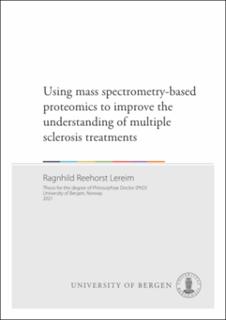| dc.contributor.author | Lereim, Ragnhild Reehorst | |
| dc.date.accessioned | 2021-06-22T07:31:00Z | |
| dc.date.available | 2021-06-22T07:31:00Z | |
| dc.date.issued | 2021-06-23 | |
| dc.date.submitted | 2021-06-02T10:03:57.679Z | |
| dc.identifier | container/5e/ca/dc/fe/5ecadcfe-fcb1-4e6e-a11e-9e940b9f399a | |
| dc.identifier.isbn | 9788230860694 | |
| dc.identifier.isbn | 9788230859995 | |
| dc.identifier.uri | https://hdl.handle.net/11250/2760535 | |
| dc.description.abstract | In this work, the effects of multiple sclerosis (MScl) treatments were investigated by quantitative proteomics. First, the effects of the anti-inflammatory drug Fingolimod was studied to see if the drug affected central nervous system (CNS) repair in a non-inflammatory MScl mouse model. Next, the cerebrospinal fluid (CSF) proteome was investigated to learn more about the treatment response and mechanism of action in the CNS of MScl patients treated with the anti-inflammatory drug Natalizumab.
Proteomic analysis identified over 6000 proteins in the frontal right hemisphere of the mouse model. Abundance changes of these proteins were measured during de- and remyalination and confirmed the global proteome effects of the disease model known from previous studies. The analysis showed no benefit of Fingolimod on myelination, which was also supported by histological analyses of brain sections in the corpus callosum. However, the proteomic approach did detect a novel reduction in one of the drug receptors known to be expressed in several cells in the brain.
CSF samples from MScl patients in Czech cohort with a relapsing-remitting (RRMS) disease course was sampled at the beginning of, and after approximately two years of treatment. Proteomic changes during treatment were then related to disease processes in RRMS by comparison to online datasets in CSF-PR. The findings confirmed the known anti-inflammatory effect of Natalizumab, but also revealed previously unknown effects of the treatment on neurological proteins and metabolism.
Finally, targeted proteomics assays were created based on biomarker candidates from existing literature, with the long-term goal of defining a biomarker panel for clinical use. Proteins linked to known disease processes were selected based on, e.g., peptide uniqueness, inter- and intra-day stability and optimal digestion time, in order to design robust assays that can be compared over time. | en_US |
| dc.language.iso | eng | en_US |
| dc.publisher | The University of Bergen | en_US |
| dc.relation.haspart | Paper I: Nystad AE, Lereim RR, Wergeland S, Oveland E, Myhr KM, Bø L, Torkildsen Ø: Fingolimod downregulates brain sphingosine-1-phosphate receptor 1 levels but does not promote remyelination or neuroprotection in the cuprizone model. J Neuroimmunol. 2020 Feb 15;339:577091. The article is available in the thesis file. The article is also available at: <a href="https://doi.org/10.1016/j.jneuroim.2019.577091" target="blank">https://doi.org/10.1016/j.jneuroim.2019.577091</a> | en_US |
| dc.relation.haspart | Paper II: Guldbrandsen A, Lereim RR, Jacobsen M, Garberg H, Kroksveen AC, Barsnes H, Berven FS. (2020): Development of robust targeted proteomics assays for cerebrospinal fluid biomarkers in multiple sclerosis, Clin Proteomics. 2020 Sep 18;17:33. The article is available at: <a href="https://hdl.handle.net/11250/2755595" target="blank">https://hdl.handle.net/11250/2755595</a> | en_US |
| dc.relation.haspart | Paper III: Lereim RR, Nytrova P, Myhr KM, Barsnes H, Berven FS: Evidence from cerebrospinal fluid proteomics suggests that natalizumab promote anti-inflammatory and repair effects in multiple sclerosis. The article is not available in BORA. | en_US |
| dc.rights | Copyright the Author. All rights reserved | |
| dc.title | Using mass spectrometry-based proteomics to improve the understanding of multiple sclerosis treatments | en_US |
| dc.type | Doctoral thesis | en_US |
| dc.date.updated | 2021-06-02T10:03:57.679Z | |
| dc.rights.holder | Copyright the Author. | en_US |
| dc.description.degree | Doktorgradsavhandling | |
| fs.unitcode | 13-14-0 | |
